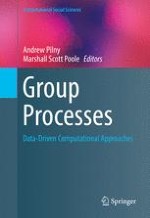2017 | OriginalPaper | Buchkapitel
8. Simulation and Virtual Experimentation: Grounding with Empirical Data
verfasst von : Deanna Kennedy, Sara McComb
Erschienen in: Group Processes
Aktivieren Sie unsere intelligente Suche, um passende Fachinhalte oder Patente zu finden.
Wählen Sie Textabschnitte aus um mit Künstlicher Intelligenz passenden Patente zu finden. powered by
Markieren Sie Textabschnitte, um KI-gestützt weitere passende Inhalte zu finden. powered by
